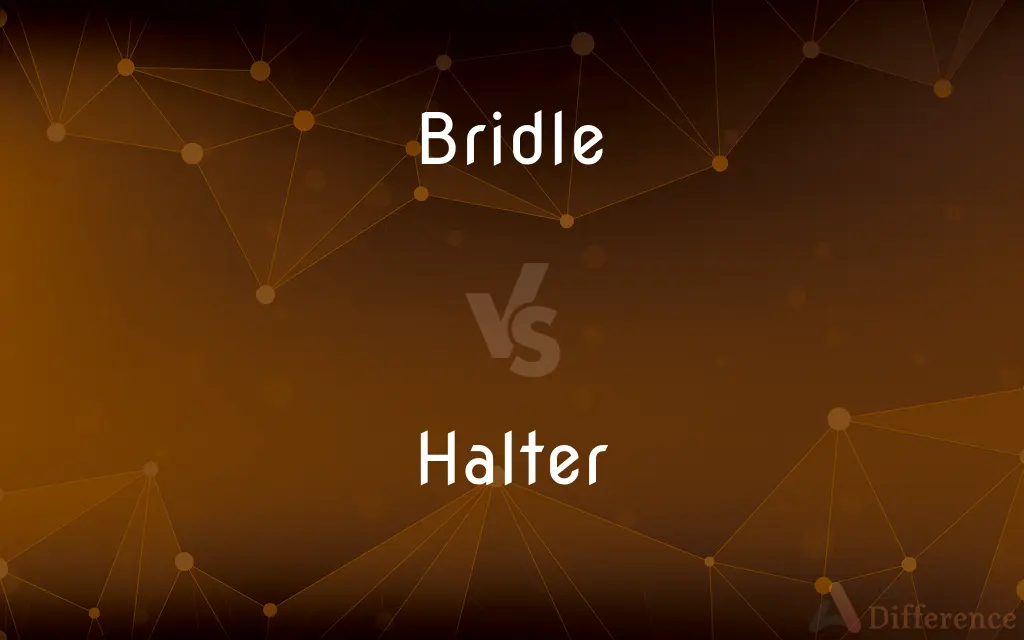Bridle vs. Halter — What's the Difference?
Edited by Tayyaba Rehman — By Fiza Rafique — Updated on May 6, 2024
A bridle is a piece of tack used in riding that holds the bit, while a halter is used to lead or tie up a horse without a bit.

Difference Between Bridle and Halter
Table of Contents
ADVERTISEMENT
Key Differences
A bridle consists of a headstall, reins, and a bit that fits in the horse's mouth. This combination allows riders to control the horse during riding. A halter, on the other hand, is a simpler headgear that typically lacks a bit and is used for leading or securing a horse.
The bridle's bit is an integral part of the setup, giving riders more precise control over the horse's movements. In contrast, a halter, which does not have a bit, uses a noseband to guide the horse and is less direct in controlling the animal.
Bridles are specifically designed for riding, often in conjunction with specific types like Western or English styles, which accommodate different reins and bits. A halter is primarily for groundwork, used for leading, grooming, and tying horses in a non-riding context.
While bridles generally have reins to communicate commands directly from the rider to the horse, halters lack this feature and are often used with lead ropes for guiding horses while on the ground.
A bridle is essential for disciplines like dressage, show jumping, and eventing, where precision in communication is crucial. In contrast, a halter is better suited for everyday handling tasks such as grooming, leading, or veterinary work.
ADVERTISEMENT
Comparison Chart
Purpose
Riding and precise control
Leading, securing, and grooming
Bit
Typically includes a bit
Does not include a bit
Reins
Features reins for rider communication
No reins, usually has a lead rope
Complexity
More complex with various components
Simpler structure
Application
Riding disciplines
Groundwork tasks
Compare with Definitions
Bridle
Headgear used for a horse in riding.
The rider carefully adjusted the bridle before mounting her horse.
Halter
Often used with a lead rope for guidance.
The stablehand guided the colt using the halter and a long lead rope.
Bridle
Tack piece featuring a headstall, reins, and bit.
He purchased a new bridle for the upcoming competition.
Halter
A headgear used for leading and tying a horse.
She secured the horse with a halter before grooming.
Bridle
Control mechanism for directing horses during riding.
She pulled gently on the bridle to turn her horse left.
Halter
Typically features a noseband and throatlatch.
The halter fitted snugly around the horse's head.
Bridle
Often categorized into Western or English styles.
He preferred using an English bridle for his dressage practice.
Halter
Simpler design than a bridle, without a bit.
Unlike a bridle, the halter doesn't have a bit in the horse's mouth.
Bridle
A harness arrangement allowing precise steering.
The bridle enabled the rider to navigate sharp turns effortlessly.
Halter
Commonly made of leather or nylon webbing.
Her new halter was crafted from durable nylon webbing.
Bridle
A bridle is a piece of equipment used to direct a horse. As defined in the Oxford English Dictionary, the "bridle" includes both the headstall that holds a bit that goes in the mouth of a horse, and the reins that are attached to the bit.
Halter
A halter or headcollar is headgear that is used to lead or tie up livestock and, occasionally, other animals; it fits behind the ears (behind the poll), and around the muzzle. To handle the animal, usually a lead rope is attached.
Bridle
The headgear used to control a horse, consisting of buckled straps to which a bit and reins are attached
Grooms came at once to take the bridles
Halter
A device made of rope or straps that fits around the head of an animal and is used to lead or secure the animal.
Bridle
Put a bridle on (a horse)
Five horses, saddled and bridled, were tied by the reins to branches of trees
Halter
A rope with a noose used for execution by hanging.
Bridle
Show one's resentment or anger, especially by throwing up one's head and drawing in one's chin
She bridled at his tone
Halter
Death or execution by hanging.
Bridle
A harness, consisting of a headstall, bit, and reins, fitted about a horse's head and used to restrain or guide the animal.
Halter
A garment having a front supported by a strap or straps running behind the neck, leaving the arms, shoulders, and back bare.
Bridle
A curb or check
Put a bridle on spending.
Halter
Either of the small, clublike balancing organs that are the rudimentary hind wings of flies. Also called balancer.
Bridle
(Nautical) A span of chain, wire, or rope that can be secured at both ends to an object and slung from its center point.
Halter
Of, relating to, or being a garment having a front that is supported by a strap or straps running behind the neck
A halter dress.
Bridle
To put a bridle on.
Halter
To put a halter on.
Bridle
To control or restrain
Could not bridle his excitement at the news.
Halter
To control with or as if with a halter.
Bridle
To lift the head and draw in the chin in anger or resentment.
Halter
(Archaic) To hang (someone).
Bridle
To be angry or resentful; take offense
Bridling at the criticism.
Halter
A bitless headpiece of rope or straps, placed on the head of animals such as cattle or horses to lead or tie them.
Bridle
The headgear with which a horse is directed and which carries a bit and reins.
Halter
A rope with a noose, for hanging criminals; the gallows rope.
Bridle
(figurative) A restraint; a curb; a check.
Halter
A halter top.
Bridle
A length of line or cable attached to two parts of something to spread the force of a pull, as the rigging on a kite for attaching line.
Halter
One who halts or limps; a cripple.
Bridle
A mooring hawser.
Halter
(transitive) To place a halter on.
What do you mean, you didn't halter the horses when we stopped for the night?
Bridle
A piece in the interior of a gunlock which holds in place the tumbler, sear, etc.
Halter
One who halts or limps; a cripple.
Bridle
A gesture expressing pride or vanity.
Halter
A strong strap or cord.
No man e'er felt the halter drawWith good opinion of the law.
Bridle
(transitive) To put a bridle on.
Halter
To tie by the neck with a rope, strap, or halter; to put a halter on; to subject to a hangman's halter.
Bridle
(transitive) To check, restrain, or control with, or as if with, a bridle; as in bridle your tongue.
Halter
Rope or canvas headgear for a horse, with a rope for leading
Bridle
(intransitive) To show hostility or resentment.
Immigrant-rights and religious organizations bridled at the plan to favor highly skilled workers over relatives. (Houston Chronicle, 6/8/2007)
Halter
A rope that is used by a hangman to execute persons who have been condemned to death by hanging
Bridle
(intransitive) To hold up one's head proudly or affectedly.
Halter
A woman's top that fastens behind the back and neck leaving the back and arms uncovered
Bridle
The head gear with which a horse is governed and restrained, consisting of a headstall, a bit, and reins, with other appendages.
Halter
Either of the club-like rudimentary hind wings of dipterous insects; used for maintaining equilibrium during flight
Bridle
A restraint; a curb; a check.
Halter
Hang with a halter
Bridle
The piece in the interior of a gun lock, which holds in place the tumbler, sear, etc.
Halter
Prevent the progress or free movement of;
He was hampered in his efforts by the bad weather
The imperilist nation wanted to strangle the free trade between the two small countries
Bridle
A span of rope, line, or chain made fast as both ends, so that another rope, line, or chain may be attached to its middle.
Bridle
To put a bridle upon; to equip with a bridle; as, to bridle a horse.
He bridled her mouth with a silkweed twist.
Bridle
To restrain, guide, or govern, with, or as with, a bridle; to check, curb, or control; as, to bridle the passions; to bridle a muse.
Savoy and Nice, the keys of Italy, and the citadel in her hands to bridle Switzerland, are in that consolidation.
Bridle
To hold up the head, and draw in the chin, as an expression of pride, scorn, or resentment; to assume a lofty manner; - usually with up.
By her bridling up I perceived she expected to be treated hereafter not as Jenny Distaff, but Mrs. Tranquillus.
Bridle
Headgear for a horse; includes a headstall and bit and reins to give the rider or driver control
Bridle
The act of restraining power or action or limiting excess;
His common sense is a bridle to his quick temper
Bridle
Put a bridle on;
Bridle horses
Bridle
Respond to the reins, as of horses
Common Curiosities
Is it safe to tie up a horse with a bridle?
No, bridles are not designed for tying up horses; halters are safer and more appropriate for this purpose.
Do all bridles come with a bit?
Most bridles feature a bit, though bitless bridles exist for those who prefer alternative control methods.
Can you ride a horse with a halter instead of a bridle?
Riding with a halter is possible but provides less control compared to a bridle, as it lacks a bit and reins.
Why does a bridle need a bit while a halter does not?
A bit allows for more precise control during riding, whereas a halter is meant for leading and securing the horse.
Are bridles or halters more suitable for training young horses?
Halters are used initially for groundwork, while bridles are introduced later for riding training.
Are there different types of bridles for various riding disciplines?
Yes, bridles vary for different disciplines like English, Western, dressage, and show jumping, each tailored to their specific needs.
Is a bridle or halter better for beginners learning to handle horses?
A halter is better for beginners, as it's easier to handle and is less complex than a bridle, providing a safer way to learn basic horse handling.
Are bridles and halters adjustable?
Yes, both bridles and halters typically have adjustable parts to fit different horse head sizes.
What materials are commonly used to make bridles and halters?
Bridles are usually made of leather, synthetic leather, or nylon, while halters are often crafted from leather, nylon, or rope.
What should I consider when selecting a bridle or halter?
When choosing a bridle, consider the type of riding discipline, bit compatibility, and material quality. For halters, prioritize comfort, fit, and material based on intended use.
Can a horse wear a bridle and a halter simultaneously?
It's not common practice, but in some situations, like transport or training, a horse might wear both for versatility.
Can I lead a horse with a bridle?
While you can technically lead a horse with a bridle, it's less convenient and less safe than using a halter due to the reins and the bit.
Do all bridles have reins?
Yes, standard bridles include reins to allow the rider to control the horse, but some specialized bridles, like certain lunging bridles, may not.
Can I use a halter for lunging my horse?
You can lunge a horse with a halter, but using a lunge cavesson or bridle with a bit is often better for clear communication and control.
Is there a specific type of halter for show purposes?
Yes, show halters are designed to be more decorative and are often used in conformation classes where the horse's appearance is judged.
Share Your Discovery

Previous Comparison
Reading vs. Review
Next Comparison
Pangasinan vs. TagalogAuthor Spotlight
Written by
Fiza RafiqueFiza Rafique is a skilled content writer at AskDifference.com, where she meticulously refines and enhances written pieces. Drawing from her vast editorial expertise, Fiza ensures clarity, accuracy, and precision in every article. Passionate about language, she continually seeks to elevate the quality of content for readers worldwide.
Edited by
Tayyaba RehmanTayyaba Rehman is a distinguished writer, currently serving as a primary contributor to askdifference.com. As a researcher in semantics and etymology, Tayyaba's passion for the complexity of languages and their distinctions has found a perfect home on the platform. Tayyaba delves into the intricacies of language, distinguishing between commonly confused words and phrases, thereby providing clarity for readers worldwide.
















































